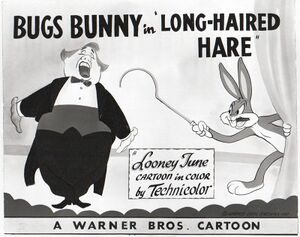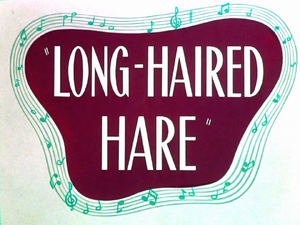Long-Haired Hare
| Long-Haired Hare | |
|---|---|
 Lobby card. | |
| Production company | Warner Bros. Cartoons |
| Distributor | Warner Bros. Pictures The Vitaphone Corporation |
| Release date | June 25, 1949 |
| Run time | 7:35 |
| Starring | Mel Blanc Nicolai Shutorov |
| Music composition | Carl Stalling |
| Story | Mike Maltese |
| Animation | Philip Monroe Ben Washam Lloyd Vaughan Ken Harris |
| Director(s) | Charles M. Jones |
| Series navigation | |
| ← Previous | Next → |
| Title card | |

| |
Long-Haired Hare is the two hundred and fifty-fifth Looney Tunes theatrical short. It was distributed Warner Bros. Pictures and The Vitaphone Corporation on June 25, 1949. It was written by Michael Maltese and directed by Chuck Jones.
When Bugs encounters both a music and rabbit hater by the name of Giovanni Jones, he decides to heckle him during his concert at night.
Detailed summary
Memorable quotes
Bugs: Of course you know, this means war!
Characters
In order of appearance: | ||||||||||
| ||||||||||
Locations
- Earth
- United States
- California
- Giovanni's residence
- Hollywood
- California
- United States
Objects
- Banjo
- Harp
- Tuba
- Croquet mallet
- Bottle of alum
- Stick of dynamite
- Autograph book
- Earmuff Noise Silencers
Production
Development
Filming
Music
The score was composed by Carl W. Stalling. The main title and closing themes are a rendition of "Merrily We Roll Along," which was arranged by Stalling.
Some of the songs in this short – which consist of operatic pieces – were sung by Nicolai Shutorov, who provided the singing voice for Giovanni Jones. The following pieces are as follows:
- "A Rainy Night in Rio" by Arthur Schwartz - sung by Bugs on the banjo, and later by Giovanni, who unknowingly performs it
- "Largo al factotum" from The Barber of Seville (Il barbiere di Siviglia), by Gioacchino Rossini - sung by Giovanni during his rehearsal, and later in the concert as its second piece
- "My Gal is a High-Born Lady" by Barney Fagan - sung by Bugs on a harp and Giovanni
- "When Yuba Plays the Rumba on the Tuba" by Herman Hupfeld - performed by Bugs on a tuba
- "Chi Mi Frena In Tal Momento" from Lucia di Lammermoor, by Gaetano Donizetti - the first piece performed by Giovanni and the concert's orchestra
- "Prelude, 2nd theme" from Act III of Lohengrin, by Richard Wagner - the third piece of the concert that plays when Bugs (in disguise) hands Giovanni an autograph
- "Overture" from Die schöne Galathee, by Franz von Suppé - the final piece of the concert, before Bugs arrives in the guise of Leopold Stokowski
Release
Dates are in order of release:
- United States: June 25, 1949
Behind the scenes
- The title, in addition to including a play on the words "hair" and "hare", is also a pun on "longhairs", a characterization of classical music lovers.[1]
- The MPAA certificate number is 12516.
- Giovanni's last name is derived from director Chuck Jones.
- According to Daniel Goldmark, the director of the Center for Popular Music Studies at Case Western Reserve University, the clash established between Giovanni and Bugs is a struggle between classical music and popular music; Giovanni acts as if he is protecting the word of "good" music from the ignorant masses, which Bugs represents, while the latter signs folk melodies that Giovanni views as a disease, as Giovanni represents the music establishment.[1]
- As stated by the DVD commentary, Bugs' conducting performance as "Leopold" is a send-up of Leopold Stokowski's energetic style, including his lack of baton.
- When Bugs forces Giovanni to hold onto an extremely long vocal note, he sings a high G.[1]
Errors
- While "Chi Mi Frena In Tal Momento" is performed in this short as solo piece, the piece itself is actually a sextet, with a tenor and a baritone making the joint first entry and four other characters to join the sextet shortly thereafter. No one but Giovanni is on stage and how he is able to sing the piece in question is unclear.
Connections
- This short, albeit edited for time, was used in the feature compilation film The Bugs Bunny/Road Runner Movie.
- Giovanni Jones and Bugs' Leopold persona would both appear in the 2018 mobile game Looney Tunes: World of Mayhem.
In popular culture
- In the Rick and Morty episode "Something Ricked This Way Comes," Rick connects his feud with the Devil to this cartoon, stating, "To me this was all just a bit like when Bugs Bunny f---s with the opera singer for twenty minutes."
Critical reception
In other languages
| Language | Name | Meaning |
|---|---|---|
Home availability
- In the United States:
- October 28, 2003: Warner Home Video releases Looney Tunes Golden Collection: Volume 1 on DVD.
- October 16, 2012: Warner Home Media releases Looney Tunes Platinum Collection: Volume 2 on Blu-ray.
- October 16, 2012: Warner Home Media releases Looney Tunes Platinum Collection: Volume 2 on Blu-ray.
- August 10, 2010: Warner Home Media releases Looney Tunes Super Stars' Bugs Bunny: Wascally Wabbit on DVD.
- April 14, 2020: Warner Bros. Home Entertainment releases Looney Tunes: Bugs Bunny Golden Carrot Collection on DVD.